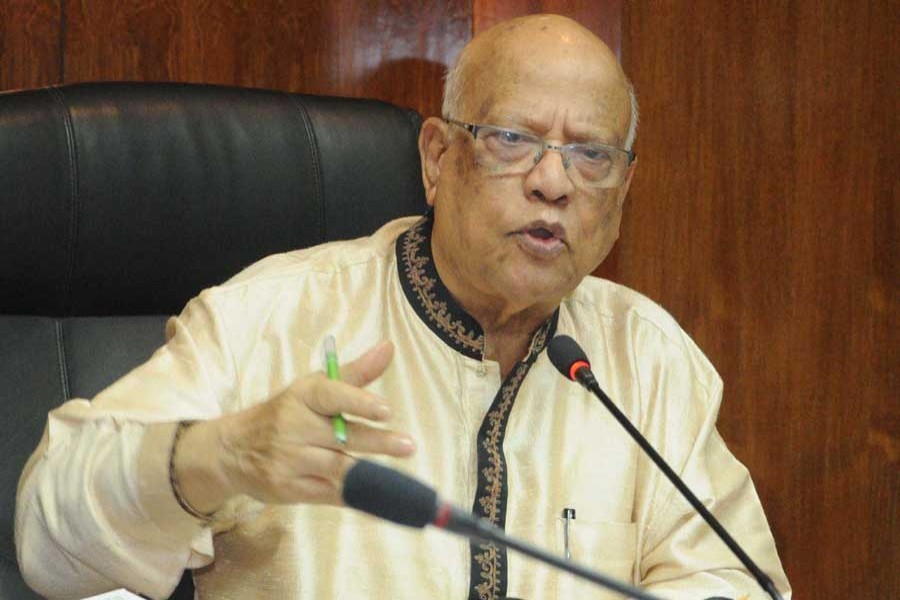The declining rate of budget implementation over the last few years is a very bad omen for the country, Finance Minister A M A Muhith has said.
"It is indeed (giving) a very bad signal," the finance minister said while speaking at a roundtable at the National Press Club in the capital on Monday.
Mr Muhith's remark came when former finance advisor Dr A B Mirza Azizul Islam pointed out that the rate of budget implementation has dropped from 93 per cent in 2012 to around 80 per cent (at present).
"We need to think about how we can come out of it. We need to find the areas where we need reforms," said the finance minister, who is scheduled to place his tenth consecutive budget in the first week of next month.
Mr Muhith regretted that the government has initiated several reforms to ease the process of budget implementation, but those did not bear any fruit.
"For example, I have been trying to form a pool of project directors for the last two years. But until now, even a list of project directors has not been prepared. This is totally a bureaucratic failure," he said.
The finance minister also admitted that the recent series of scams in the banking sector is a 'very serious matter' for the country.
"Probably, it is the time to form another banking commission. The last banking commission was formed back in 2004. Since then, the banking sector has grown substantially."
"I thought that such a large banking sector would gradually move towards merger, but that did not happen," he noted.
The finance minister also emphasized recasting the bankruptcy law to facilitate the banks' merger and bankruptcy process.
Earlier, Mirza Azizul Islam in his speech cautioned against the recent depreciation of Bangladeshi Taka.
"We need to think about ways to handle our current account deficit, so that our exchange rate does not depreciate further," Mr Islam said.
Referring to this, Mr Muhith said the government would like to focus on this issue after the budget.
"Although, we have a floating exchange rate, it is actually a managed one," he added
"Some fresh thinking is necessary in this regard. I want to discuss this issue after the budget," he added.
Mr Islam also raised the issue of ever-increasing volume of debt servicing liability of the state-owned enterprises (SoEs).
Referring to this, the finance minister admitted that government has failed to ensure enough supervision for the SoEs.
"It is our failure that we are not ensuring enough supervision (in this regard). This is something we have to look into," he added.
Prime Minister's Economic Affairs Adviser Dr Mashiur Rahman in his speech said the country will enjoy its demographic dividend until 2050.
"However, we need to focus on technical, vocational and engineering education to reap the benefit of this dividend."
He also called for increasing the decision-making power of the Bangladesh Investment Development Authority (BIDA) and other relevant organisations to increase foreign direct investment (FDI) flow into the country.
"We can increase the FDI inflow by almost 40 per cent by streamlining the process of starting a business in the country," he opined.
Presenting the keynote paper of the event, Chairman of Bangladesh Study Trust Dr A K Abdul Momen called for bringing more multinational companies and SoEs to the capital market.
"Especially, the newly-listed companies can be given two-year tax holiday to encourage more entities to come to the capital market."
He also called for issuing the Tax Identification Number (TIN) against all National Identity (NID) cards to bring more people under the tax net.
In addition, Mr Momen also recommended further decentralisation of the government.
He also suggested introduction of district government system to expedite the decision-making process as well as to increase the pace of execution of the development projects.


